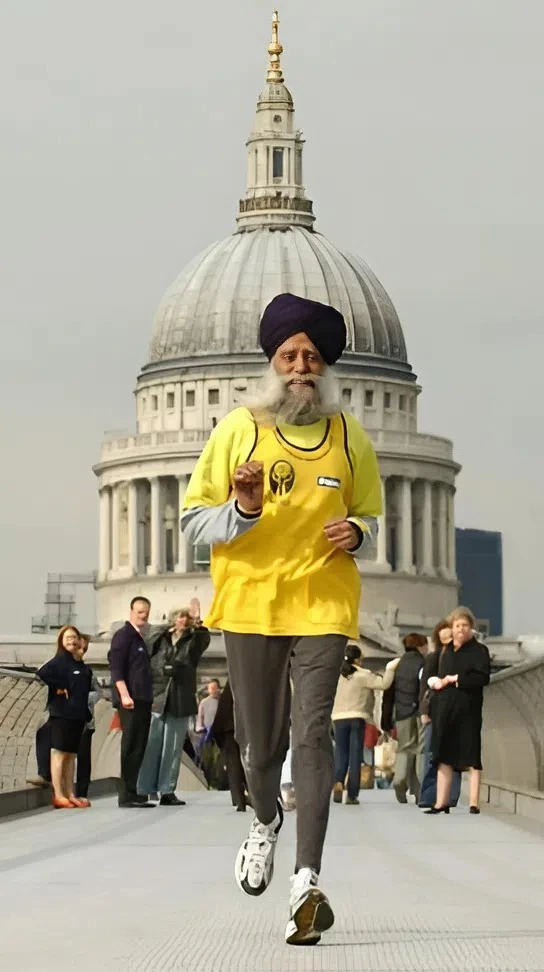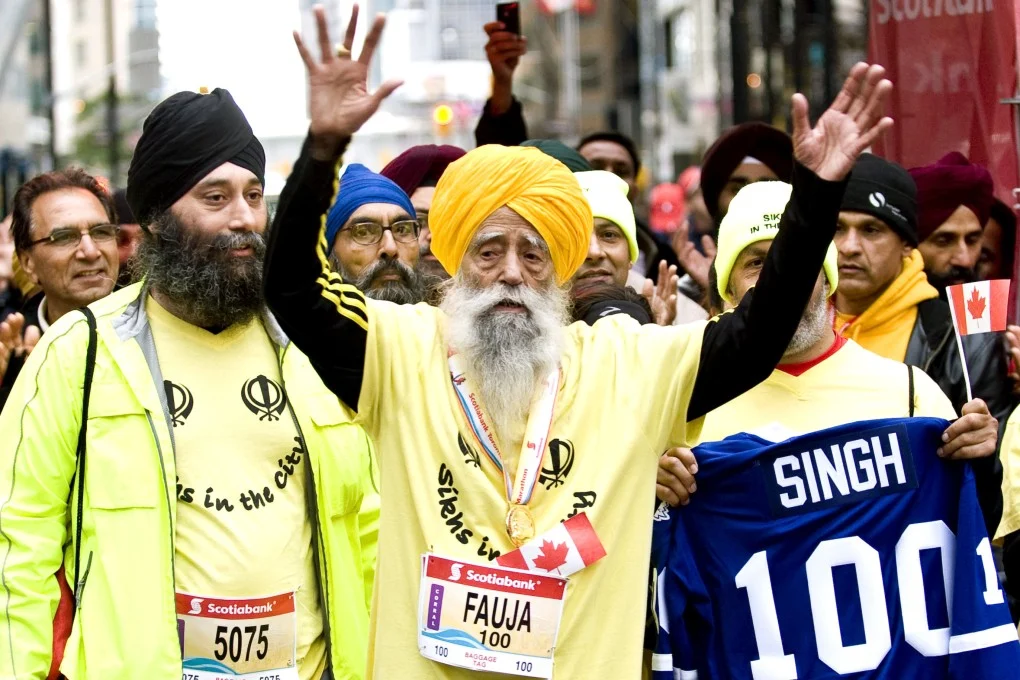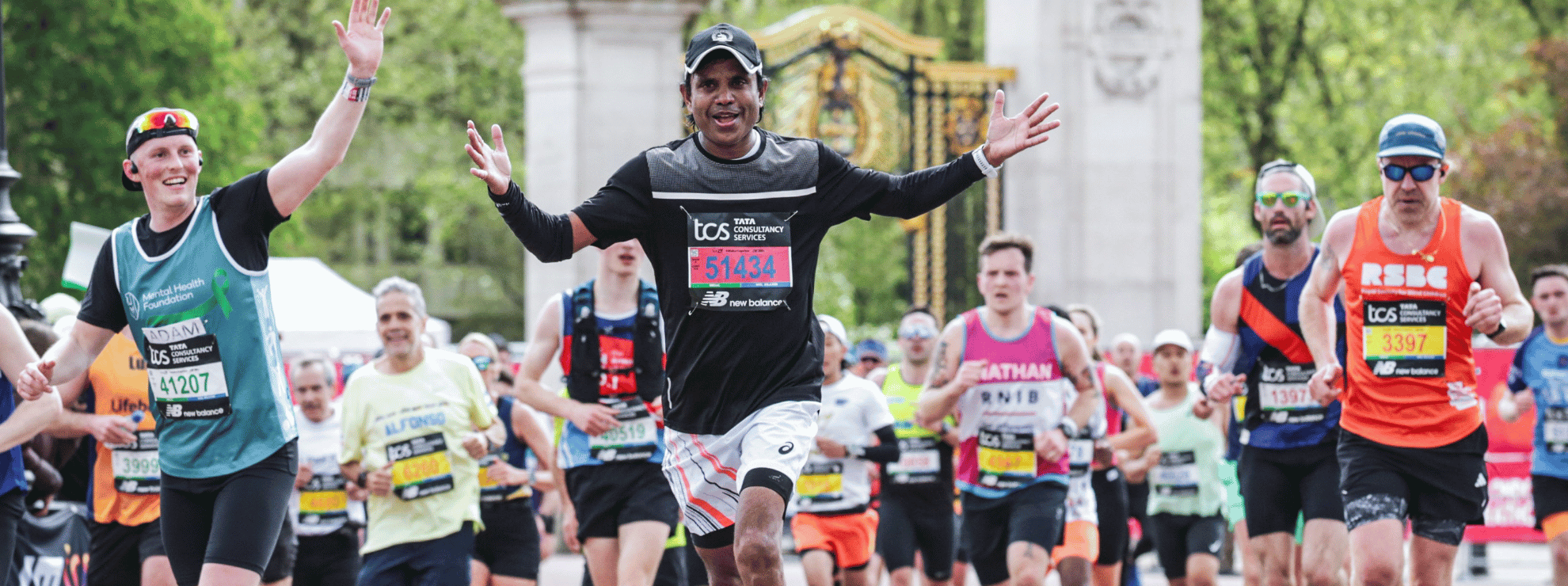(July 16, 2025) When Adidas replaced football icon David Beckham with a 93-year-old Sikh marathoner in its global Impossible is Nothing campaign, the world took notice. The man was Fauja Singh, slight in frame, wrapped in white, his turban neatly tied. He ran his first marathon at 89 and kept racing competitively until he was 101, retiring from official events in 2013. But Singh who was popularly known as the Turbaned Tornado never truly stopped. For years after, he continued running for pleasure, health, and charity, earning recognition well into his 110s as the world’s oldest living marathoner.
On July 14, 2025, Fauja Singh, who carried the Olympic torch in 2012 and received the British Empire Medal in 2015 for services to sport and charity, died in a road accident in his native village of Beas Pind, Punjab.The British-Indian national was 114. His passing brought to an end a remarkable life that defied age, fitness, and the enduring power of perseverance at every stage of life.

Born with weak legs, died as a legend
Fauja Singh’s birth on April 1, 1911, in British India’s Punjab region was inauspicious by most accounts. As a child, he was so physically weak that he couldn’t walk until the age of five. His limbs were thin and frail, earning him the nickname “danda”—Punjabi for “stick.” The taunts followed him through childhood, and though he eventually became an amateur runner in his youth, he gave it up during the Partition. Life as a farmer, and then as a father, took over.
Tragedy pulled him back to the track
The death of his wife in 1992, followed by the loss of a daughter during childbirth and then a son in a construction accident in 1994, shattered Singh’s world. “I had lived in India all my life,” he recalled in an interview. “But when my son died, everything ended for me. I couldn’t live anymore. But destiny had other plans.”
In the late 1990s, he moved to Ilford, East London, to live with another son. There, at the age of 89, Singh decided to lace up his shoes again. His first appearance at a training ground in Redbridge was a sight to behold. Dressed in a three-piece suit, he asked to train for a marathon, believing it to be 26 kilometers rather than 26 miles. His coach, Harmander Singh, later described the moment vividly: “It looked like he was running away from the scene of a crime,” he joked later. But the commitment was unmistakable.
Records, relays, and replacing Beckham
In 2000, at 89, Singh ran his first marathon, the London Marathon in just under seven hours. Over the next decade, he completed marathons in New York, Toronto, and again in London, each time running with purpose and grace. In 2003, he stunned the world by running the Toronto Waterfront Marathon in 5 hours and 40 minutes, setting an unratified world best in the 90+ category. That same year, Singh became a British citizen.
Then came 2004. At 93, Singh did the unthinkable: he replaced football megastar David Beckham as the face of Adidas’ Impossible is Nothing campaign. His posters, showing him mid-stride with determination etched across his bearded face, were plastered across the globe, alongside icons like Muhammad Ali.
And yet, he didn’t let the fame distract from his principles. When Adidas suggested he wear a smaller patka instead of his full turban for the shoot, he flatly refused. “Now, wherever there’s a marathon in England, in Canada, or in India, every Sikh wears a turban,” he proudly declared later. “That makes me proud.”
Mass appeal and the day of eight records
If 2004 showed his mass appeal, 2011 cemented his mythic status. At age 100, Singh competed in the Ontario Masters Association Invitational in Toronto, setting eight age-group world records in a single day: from 100 meters to the 5000 meters. Some of these distances had no previous records. No one had ever attempted them at his age.
Three days later, he became the first 100-year-old claimed to have completed a full marathon crossing the finish line at the Toronto Waterfront Marathon in 8 hours, 11 minutes. Though Guinness World Records declined to certify his feat due to the absence of a birth certificate (India didn’t record births in 1911), his name was etched in the hearts of people worldwide.

The Sikh who carried the Olympic torch
Singh’s final competitive race came in 2013, at age 101, when he completed a 10-kilometre run at the Hong Kong Marathon. Locals were so in awe of him that the taxi driver taking him to a press conference refused to charge him. “I’ve never been to Hong Kong before,” Singh said then, smiling. “But it’s a fascinating place.” His running sprees took him to countries he may never have visited otherwise, something he came to deeply enjoy.
His global appeal wasn’t limited to race routes. In 2012, he was invited to carry the Olympic torch in London, a moment of profound pride for both Singh and the millions who had followed his journey. That same year, Malaysia’s second Chardikala Run was themed “101 and Running” in his honour.
Singh frequently visited India for speaking engagements and public functions, relishing the opportunity to motivate others. One of his favourite causes was raising funds for ailing infants. “The oldest running for the youngest,” he called it.
Royal recognition, a vegetarian’s code and giving back
In 2015, Queen Elizabeth II conferred upon him the British Empire Medal (BEM) for services to sport and charity. It was one of two occasions when she sent him personal birthday greetings. The first in 2011 when he turned 100, and again in 2016 on his 105th birthday. “I have everything I want,” he once said. “The whole world loves and respects me. I survive on a diet of love and respect.”
Singh attributed his long life and vitality to his strict lifestyle. He abstained from alcohol and tobacco, followed a vegetarian diet, and lived without greed. “I have no ego and no desire to hoard wealth,” he said in an interview. “The pension I get, I donate what’s left. I recently donated millions to Pingalwara.”
His diet comprised phulka, dal, green vegetables, yogurt and milk. No parathas, pakoras, or fried food. And lots of ginger tea.
“Now people start using a walking stick at 60. Look at me, I’ve never used one,” he said once, “Yes, my eyesight and hearing have faded, but I am still fit.”
The final cheer
Though Singh retired from competitive running in 2013, he remained deeply connected to the running world. Until 2023, he regularly attended marathon events, cheering from the sidelines, often with his trademark radiant smile and folded hands. He was a familiar and beloved presence among running groups like Sikhs in the City, whose “Golden Oldies” relay team once boasted a combined age of 397 years.
On July 14, 2025, while crossing a road in his native village, Beas Pind, his life was suddenly and tragically cut short. News of his passing sparked tributes from across continents. Londoners remembered him from his torch run. Canadians recalled his historic finishes. Sikhs everywhere mourned the loss of a community elder who had made the turban a symbol of athletic grace.
Lessons in living long and well
Apart from providing inspiration for all his records, medals, and milestones, what he offered most was his philosophy of simplicity, humility, purpose and longevity. “Exercise every day. Eat less. Live clean. Think of God in the last six miles,” he once said.
In the world of sport, his body is gone. But in every finish line crossed by someone who was told they were “too old,” his soul is running. Fauja Singh didn’t just defy age. He offered a new lens on longevity, fitness, and the strength of perseverance.”




